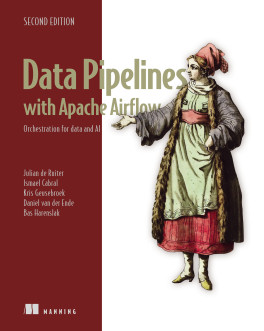pro $24.99 per month
- access to all Manning books, MEAPs, liveVideos, liveProjects, and audiobooks!
- choose one free eBook per month to keep
- exclusive 50% discount on all purchases
- renews monthly, pause or cancel renewal anytime
lite $19.99 per month
- access to all Manning books, including MEAPs!
team
5, 10 or 20 seats+ for your team - learn more

Look inside
Simplify, streamline, and scale your data operations with data pipelines built on Apache Airflow
Data Pipelines with Apache Airflow has empowered thousands of data engineers to build more successful data platforms. This new second edition has been fully revised for Airflow 3 with coverage of all the latest features of Apache Airflow, including the Taskflow API, deferrable operators, and Large Language Model integration. Filled with real-world scenarios and examples, you'll be carefully guided from Airflow novice to expert.
In Data Pipelines with Apache Airflow, Second Edition you'll learn how to:
Using real-world scenarios and examples, Data Pipelines with Apache Airflow, Second Edition teaches you how to simplify and automate data pipelines, reduce operational overhead, and smoothly integrate all the technologies in your stack. Part reference and part tutorial, each technique is illustrated with engaging hands-on examples, from training machine learning models for generative AI to optimizing delivery routes.
Data Pipelines with Apache Airflow has empowered thousands of data engineers to build more successful data platforms. This new second edition has been fully revised for Airflow 3 with coverage of all the latest features of Apache Airflow, including the Taskflow API, deferrable operators, and Large Language Model integration. Filled with real-world scenarios and examples, you'll be carefully guided from Airflow novice to expert.
In Data Pipelines with Apache Airflow, Second Edition you'll learn how to:
- Master the core concepts of Airflow architecture and workflow design
- Schedule data pipelines using the Dataset API and time tables, including complex irregular schedules
- Develop custom Airflow components for your specific needs
- Implement comprehensive testing strategies for your pipelines
- Apply industry best practices for building and maintaining Airflow workflows
- Deploy and operate Airflow in production environments
- Orchestrate workflows in container-native environments
- Build and deploy Machine Learning and Generative AI models using Airflow
Using real-world scenarios and examples, Data Pipelines with Apache Airflow, Second Edition teaches you how to simplify and automate data pipelines, reduce operational overhead, and smoothly integrate all the technologies in your stack. Part reference and part tutorial, each technique is illustrated with engaging hands-on examples, from training machine learning models for generative AI to optimizing delivery routes.
about the technology
Apache Airflow provides a unified platform for collecting, consolidating, cleaning, and analyzing data. With its easy-to-use UI, powerful scheduling and monitoring features, plug-and-play options, and flexible Python scripting, Airflow makes it easy to implement secure, consistent pipelines for any data or AI task.about the book
Data Pipelines with Apache Airflow, Second Edition teaches you how to build, monitor, and maintain effective data workflows. This new edition adds comprehensive coverage of Airflow 3 features, such as event-driven scheduling, dynamic task mapping, DAG versioning, and Airflow’s entirely new UI. The numerous examples address common use cases like data ingestion and transformation and connecting to multiple data sources, along with AI-aware techniques such as building RAG systems.what's inside
- Deploying data pipelines as Airflow DAGs
- Time and event-based scheduling strategies
- Integrating with databases, LLMs, and AI models
- Deploying Airflow using Kubernetes
about the reader
For data engineers, machine learning engineers, DevOps, and sysadmins with intermediate Python skills.A fun journey through Apache Airflow, well illustrated with practical examples.
Clear, well-structured, and surprisingly easy to follow.
A practical, clear, and well-structured guide.
Focuses on parts that are important today, and will remain important in a long time. Definitely worth having.
Clear structure, practical examples, and useful chapter summaries guided me step by step, in a clear and enjoyable way.
choose your plan
team
monthly
annual
$49.99
$499.99
only $41.67 per month
- five seats for your team
- access to all Manning books, MEAPs, liveVideos, liveProjects, and audiobooks!
- choose another free product every time you renew
- choose twelve free products per year
- exclusive 50% discount on all purchases
- renews monthly, pause or cancel renewal anytime
- renews annually, pause or cancel renewal anytime
-
![]() Data Pipelines with Apache Airflow, Second Edition ebook for free
Data Pipelines with Apache Airflow, Second Edition ebook for free
choose your plan
team
monthly
annual
$49.99
$499.99
only $41.67 per month
- five seats for your team
- access to all Manning books, MEAPs, liveVideos, liveProjects, and audiobooks!
- choose another free product every time you renew
- choose twelve free products per year
- exclusive 50% discount on all purchases
- renews monthly, pause or cancel renewal anytime
- renews annually, pause or cancel renewal anytime
-
![]() Data Pipelines with Apache Airflow, Second Edition ebook for free
Data Pipelines with Apache Airflow, Second Edition ebook for free
choose your plan
team
monthly
annual
$49.99
$499.99
only $41.67 per month
- five seats for your team
- access to all Manning books, MEAPs, liveVideos, liveProjects, and audiobooks!
- choose another free product every time you renew
- choose twelve free products per year
- exclusive 50% discount on all purchases
- renews monthly, pause or cancel renewal anytime
- renews annually, pause or cancel renewal anytime
-
![]() Data Pipelines with Apache Airflow, Second Edition ebook for free
Data Pipelines with Apache Airflow, Second Edition ebook for free
















 Data Pipelines with Apache Airflow, Second Edition ebook for free
Data Pipelines with Apache Airflow, Second Edition ebook for free